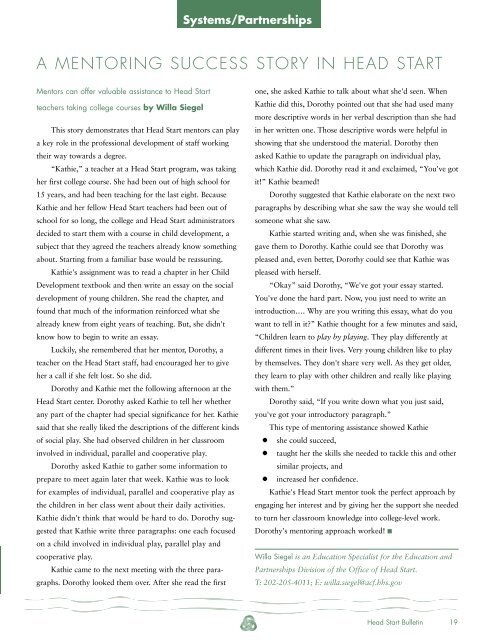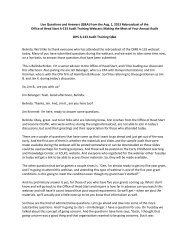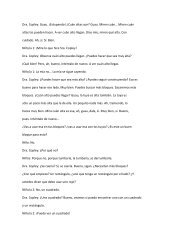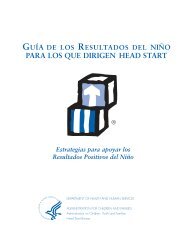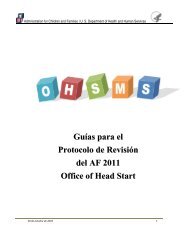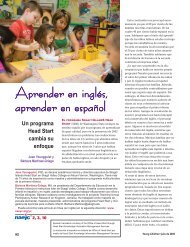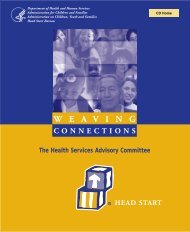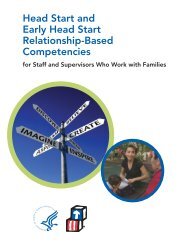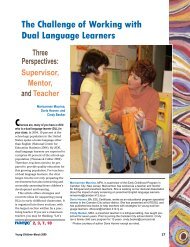Professional Development - Head Start - U.S. Department of Health ...
Professional Development - Head Start - U.S. Department of Health ...
Professional Development - Head Start - U.S. Department of Health ...
Create successful ePaper yourself
Turn your PDF publications into a flip-book with our unique Google optimized e-Paper software.
This story demonstrates that <strong>Head</strong> <strong>Start</strong> mentors can play<br />
a key role in the pr<strong>of</strong>essional development <strong>of</strong> staff working<br />
their way towards a degree.<br />
“Kathie,” a teacher at a <strong>Head</strong> <strong>Start</strong> program, was taking<br />
her first college course. She had been out <strong>of</strong> high school for<br />
15 years, and had been teaching for the last eight. Because<br />
Kathie and her fellow <strong>Head</strong> <strong>Start</strong> teachers had been out <strong>of</strong><br />
school for so long, the college and <strong>Head</strong> <strong>Start</strong> administrators<br />
decided to start them with a course in child development, a<br />
subject that they agreed the teachers already know something<br />
about. <strong>Start</strong>ing from a familiar base would be reassuring.<br />
Kathie's assignment was to read a chapter in her Child<br />
<strong>Development</strong> textbook and then write an essay on the social<br />
development <strong>of</strong> young children. She read the chapter, and<br />
found that much <strong>of</strong> the information reinforced what she<br />
already knew from eight years <strong>of</strong> teaching. But, she didn't<br />
know how to begin to write an essay.<br />
Luckily, she remembered that her mentor, Dorothy, a<br />
teacher on the <strong>Head</strong> <strong>Start</strong> staff, had encouraged her to give<br />
her a call if she felt lost. So she did.<br />
Dorothy and Kathie met the following afternoon at the<br />
<strong>Head</strong> <strong>Start</strong> center. Dorothy asked Kathie to tell her whether<br />
any part <strong>of</strong> the chapter had special significance for her. Kathie<br />
said that she really liked the descriptions <strong>of</strong> the different kinds<br />
<strong>of</strong> social play. She had observed children in her classroom<br />
involved in individual, parallel and cooperative play.<br />
Dorothy asked Kathie to gather some information to<br />
prepare to meet again later that week. Kathie was to look<br />
for examples <strong>of</strong> individual, parallel and cooperative play as<br />
the children in her class went about their daily activities.<br />
Kathie didn't think that would be hard to do. Dorothy suggested<br />
that Kathie write three paragraphs: one each focused<br />
on a child involved in individual play, parallel play and<br />
cooperative play.<br />
Kathie came to the next meeting with the three paragraphs.<br />
Dorothy looked them over. After she read the first<br />
Systems/Partnerships<br />
A MENTORING SUCCESS STORY IN HEAD START<br />
Mentors can <strong>of</strong>fer valuable assistance to <strong>Head</strong> <strong>Start</strong><br />
teachers taking college courses by Willa Siegel<br />
one, she asked Kathie to talk about what she'd seen. When<br />
Kathie did this, Dorothy pointed out that she had used many<br />
more descriptive words in her verbal description than she had<br />
in her written one. Those descriptive words were helpful in<br />
showing that she understood the material. Dorothy then<br />
asked Kathie to update the paragraph on individual play,<br />
which Kathie did. Dorothy read it and exclaimed, “You've got<br />
it!” Kathie beamed!<br />
Dorothy suggested that Kathie elaborate on the next two<br />
paragraphs by describing what she saw the way she would tell<br />
someone what she saw.<br />
Kathie started writing and, when she was finished, she<br />
gave them to Dorothy. Kathie could see that Dorothy was<br />
pleased and, even better, Dorothy could see that Kathie was<br />
pleased with herself.<br />
“Okay” said Dorothy, “We've got your essay started.<br />
You've done the hard part. Now, you just need to write an<br />
introduction…. Why are you writing this essay, what do you<br />
want to tell in it?” Kathie thought for a few minutes and said,<br />
“Children learn to play by playing. They play differently at<br />
different times in their lives. Very young children like to play<br />
by themselves. They don't share very well. As they get older,<br />
they learn to play with other children and really like playing<br />
with them.”<br />
Dorothy said, “If you write down what you just said,<br />
you've got your introductory paragraph.”<br />
This type <strong>of</strong> mentoring assistance showed Kathie<br />
� she could succeed,<br />
� taught her the skills she needed to tackle this and other<br />
similar projects, and<br />
� increased her confidence.<br />
Kathie's <strong>Head</strong> <strong>Start</strong> mentor took the perfect approach by<br />
engaging her interest and by giving her the support she needed<br />
to turn her classroom knowledge into college-level work.<br />
Dorothy's mentoring approach worked! ■<br />
Willa Siegel is an Education Specialist for the Education and<br />
Partnerships Division <strong>of</strong> the Office <strong>of</strong> <strong>Head</strong> <strong>Start</strong>.<br />
T: 202-205-4011; E: willa.siegel@acf.hhs.gov<br />
<strong>Head</strong> <strong>Start</strong> Bulletin 19


